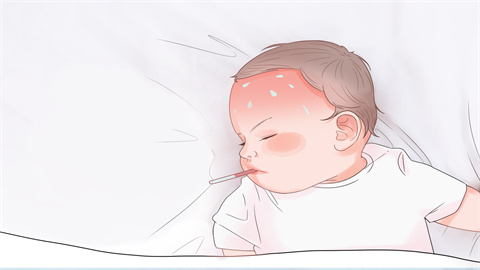What should I do if a 5-month-old baby has a fever and diarrhea?
Generally speaking, fever refers to an elevated body temperature. Fever and diarrhea in a 5-month-old baby may be related to causes such as immature temperature regulation function, improper feeding, gastrointestinal-type cold, rotavirus enteritis, or bacterial enteritis. It is recommended to seek timely medical attention and follow the doctor's guidance for treatments such as general supportive care and medication therapy. Detailed explanations are as follows:

1. Immature Temperature Regulation Function
A 5-month-old baby's thermoregulatory center is not yet fully developed and mature, resulting in poor adaptability to changes in ambient temperature. During the process of temperature regulation, mild gastrointestinal dysfunction may occur simultaneously, causing diarrhea. It is recommended to maintain a suitable environmental temperature for the baby and avoid excessive swaddling or overdressing.
2. Improper Feeding
Feeding too much or too quickly, or inappropriate introduction of complementary foods, may increase the gastrointestinal burden on the baby, leading to indigestion and subsequent fever and diarrhea. It is recommended to follow the principle of small, frequent meals and gradually introduce complementary foods.
3. Gastrointestinal-Type Cold (Viral Gastroenteritis)
Gastrointestinal-type cold is usually caused by viral infection. The virus not only affects the upper respiratory tract but also involves the gastrointestinal tract, causing symptoms such as fever and diarrhea in the baby. It is often accompanied by symptoms like runny nose, cough, and vomiting. Medications such as Lanqin Oral Liquid, Oral Rehydration Salts I, and Bifidobacterium Quadruple Live Tablets should be used according to the doctor's instructions.
4. Rotavirus Enteritis
Rotavirus enteritis is generally caused by rotavirus infection. The virus invades the intestines, causing inflammation and edema of the intestinal mucosa, leading to fever and diarrhea. Symptoms such as vomiting, abdominal pain, and dehydration may also occur. Treatment may include medications such as Montmorillonite Powder, Bifidobacterium Quadruple Live Tablets, and Berberine Hydrochloride Tablets, as directed by a physician.
5. Bacterial Enteritis
Bacterial enteritis is typically caused by bacterial infection of the intestines. The bacteria release toxins that irritate the intestinal mucosa, causing fever and diarrhea. Symptoms such as abdominal pain, bloating, and tenesmus may also appear. Under a doctor's recommendation, medications such as Amoxicillin Granules, Cefixime Granules, or Norfloxacin Capsules may be used for treatment.
During treatment and recovery, it is recommended to maintain a light diet by choosing bland, easily digestible foods. This can reduce the gastrointestinal burden, supply necessary nutrients, and promote physical recovery.




